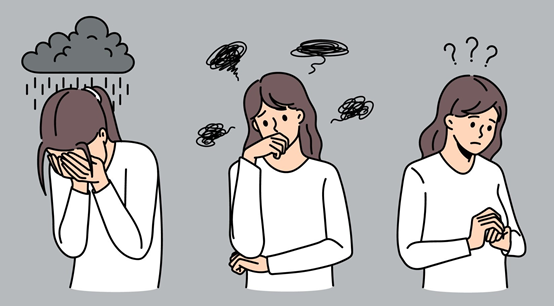Sedentary Lifestyle and Mental Health: Understanding the Connection
More and more research shows that sitting too much not only seriously harms physical health, increasing the risk of obesity, spinal issues, heart disease and other problems. It’s also linked to a higher risk of mental health problems like depression and anxiety in people of all ages.
How Prolonged Sitting Affects Mental Health
The brain needs good blood flow and energy supply to work properly. Sitting too long or not exercising enough lowers the levels of mood-boosting chemicals, making it harder to feel happy and relaxed. It also slows blood circulation, affecting thinking and emotions, which can worsen mental health problems.
Mental Health Risks of a Sedentary Lifestyle
A study[1] shows that people who sit for 8 or more hours a day raise the risk of depression compared to sitting for 5 hours or less. Sitting for a long time can reduce blood flow and cause muscle tension. This may lower endorphins and serotonin, which help control mood. Symptoms of depression include ongoing sadness, low energy, trouble focusing and loss of interest in life. It can also cause physical symptoms, such as loss of appetite, insomnia, and pain in different parts of the body. According to WHO [2], over 700,000 people worldwide die by suicide each year due to depression. This has become a growing public health crisis, especially among young people.
Research [3] suggests that the more time a person spends sitting, the higher their risk of anxiety. Lack of exercise stops the release of brain chemicals and causes physical discomfort, such as tension in the back, neck, or shoulders, making stress worse. Anxiety disorders trigger constant restlessness and fear, often accompanied by dizziness, heart palpitations, sweating, and even a sense of impending doom. These effects can severely impact daily life, making it hard to focus, work, or complete routine tasks.
Mental disorders like depression and anxiety are often linked to the loss of memory and attention, and sedentary behavior can make these issues worse. An experiment [4] found that sitting for long hours is linked to brain thinning in areas important for memory. People who sit for 15 hours daily have a 10% thinner medial temporal lobe than those who sit for 10 hours, which may raise the risk of brain diseases like Alzheimer's. As Alzheimer's progresses, patients will lose cognitive abilities and basic functions like eating, walking, and controlling bodily functions. Worryingly, research [5] shows that It is worth noting that Alzheimer’s and similar brain conditions are affecting younger people, yet there is still no cure.
Offset the Dangers of Sedentary
Spending long hours sitting has become a common habit, affecting both physical and mental health. However, small changes can help you stay active and improve your well-being. Here are some easy tips:
Whether at home or in the office, standing up and moving for five minutes every half hour can benefit your health. At home, you can try simple chores or light exercises like brisk walking or arm lifts. At work, you can try some easy stretches or walk to a colleague instead of sending a message.
Creating an ergonomic workspace in the office or at home can greatly improve both comfort and overall health. In recent years, standing desks have become popular among those who sit for long hours. Many companies, including Google, Apple, and Facebook, have introduced them as part of their employee wellness programs. An ergonomic standing desk allows users to switch between sitting and standing, helping to reduce knee and back strain while improving blood circulation.
You can learn more about how to use a sit-stand desk effectively in this article.
Other ergonomic solutions, such as monitor arms, allow users to adjust screen angle, reducing eye and neck strain for a more comfortable work experience. Accessories like footrests, risers and phone holders provide additional support, improving posture and promoting better blood circulation.
By improving posture and reducing physical strain, ergonomics not only enhance comfort but also boost focus and mood, helping to maintain a healthy and productive work routine.
To stay active, try making exercise a part of your daily routine. Exercise not only improves your health but also strengthens your heart and increases oxygen flow to your brain, helping boost memory and clear thinking. Plus, exercise triggers the release of “happy hormones” like dopamine and endorphins, which lift your mood and keep you feeling relaxed and energized.
By making small changes to your routine, you can reduce the harm of sitting too much and improve both your body and mind.
Conclusion
A sedentary lifestyle affects not only your body but also your mind. However, small changes—like regular exercise, using a standing desk, and staying active—can boost your mood, sharpen your mind, and improve your overall well-being.
LUMI focuses on enhancing well-being with ergonomic solutions. From sit-stand desks to other workplace essentials, we help you create a healthier, more active lifestyle. If you're looking for ergonomic solutions, feel free to contact us!
References:
[1] https://pmc.ncbi.nlm.nih.gov/articles/PMC5534054/
[2] https://www.who.int/news-room/fact-sheets/detail/suicide
[3] https://bmcpublichealth.biomedcentral.com/articles/10.1186/s12889-015-1843-x
[4] https://www.aarp.org/health/brain-health/info-2018/sitting-memory-loss-dementia.html





